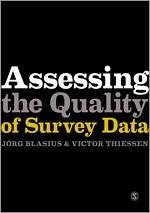Nicht lieferbar

Assessing the Quality of Survey Data
Versandkostenfrei!
Nicht lieferbar
Weitere Ausgaben:
This is a book for any researcher using any kind of survey data. It introduces the latest methods of assessing the quality and validity of such data by providing new ways of interpreting variation and measuring error. By practically and accessibly demonstrating these techniques, especially those derived from Multiple Correspondence Analysis, the authors develop screening procedures to search for variation in observed responses that do not correspond with actual differences between respondents. Using well-known international data sets, the authors exemplify how to detect all manner of non-subst...
This is a book for any researcher using any kind of survey data. It introduces the latest methods of assessing the quality and validity of such data by providing new ways of interpreting variation and measuring error. By practically and accessibly demonstrating these techniques, especially those derived from Multiple Correspondence Analysis, the authors develop screening procedures to search for variation in observed responses that do not correspond with actual differences between respondents. Using well-known international data sets, the authors exemplify how to detect all manner of non-substantive variation having sources such as a variety of response styles including acquiescence, respondents' failure to understand questions, inadequate field work standards, interview fatigue, and even the manufacture of (partly) faked interviews.




